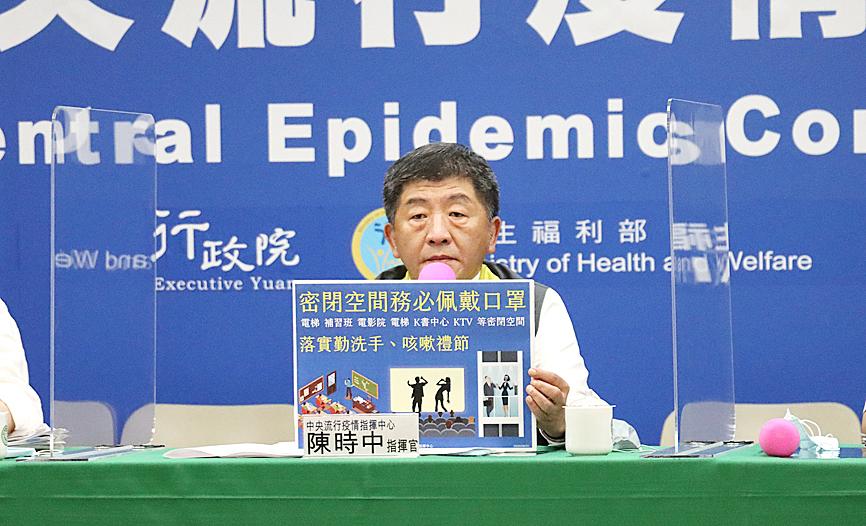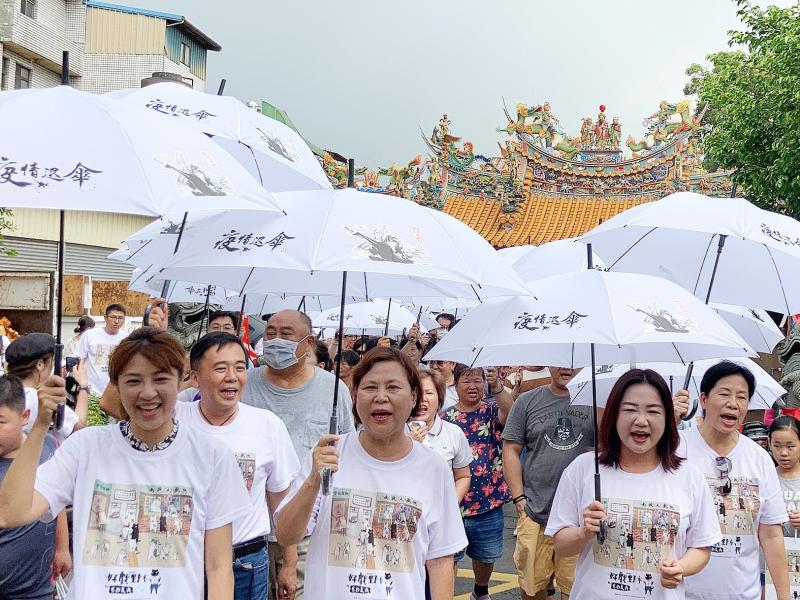The government is considering tightening mask-wearing rules again in light of a potential domestic COVID-19 infection, Minister of Health and Welfare Chen Shih-chung (陳時中) said yesterday.
The Central Epidemic Command Center (CECC) confirmed seven new COVID-19 cases, six of which are imported.
The other case involves a Belgian engineer who entered Taiwan on May 3 and remained in quarantine until May 17, said Chen, who heads the CECC.

Photo courtesy of the Central Epidemic Command Center via CNA
Although the source of infection has yet to be identified, the case could end the nation’s record of not having any domestic cases in the previous 110 days.
The Belgian, in his 20s, is a technician working on an offshore wind project in Changhua County.
He underwent COVID-19 testing to be able to return to his native country, Chen said.

Photo: Liu Pin-chuan, Taipei Times
The man tested positive in two polymerase chain reaction (PCR) tests, with cycle threshold values of 34 and 33, which Chen described as a “weak positive,” but still in the positive range for a disease considered to have an incubation period of two to 14 days.
The man was also tested for antibodies, Chen said, adding that his IgM — the first antibody the body makes when it fights a new infection — was negative, while IgG was “strongly positive.”
According to a US Federal Drug Administration fact sheet dated June 12, IgG antibodies generally start appearing about seven to 10 days after infection and often indicate a past infection.
Chen said the case has not yet been classified as an imported or domestic case, because if the man’s IgM is negative and IgG is positive, he might have been infected a long time ago.
The Belgian has been put in an isolation ward in a hospital and 89 people who had come into close contact with him are being monitored, Chen said, adding that 82 of them are under home quarantine, while the other seven are required to monitor their own health.
The Belgian had followed the rules and wore a mask on public transport, but had often gone outdoors, where he sometimes took his mask off, Chen said.
Since his movements are clear, the CECC does not plan to make them public, he said.
Five of the imported cases, men aged between 20 and 80, are from the Philippines, while the other is from Guatemala, Chen said.
They entered the nation from July 15 to Thursday and started to exhibit symptoms from July 10 to Friday, he said.
The new cases raised the nation’s total number of confirmed cases to 474 — 382 imported and 55 domestic cases, as well as 36 cases from the navy’s “Friendship Flotilla” and one case that needs further investigation.
With the pandemic raging overseas, Chen reminded Taiwanese to keep their guard up and always wear a mask when they are indoors — for example in theaters, karaoke bars, elevators and study centers.
He also urged people to wash their hands frequently and practice social distancing.
The government would maintain strict border controls, he said, adding that the nation is still safe from the risk of community outbreaks.
“If 80 percent of people often wear masks, the nation would be very safe. If only 70 percent of people did, there could be a problem, but right now the rate is under 30 percent,” he said, reiterating the importance of wearing masks indoors.

CHAOS: Iranians took to the streets playing celebratory music after reports of Khamenei’s death on Saturday, while mourners also gathered in Tehran yesterday Iranian Supreme Leader Ayatollah Ali Khamenei was killed in a major attack on Iran launched by Israel and the US, throwing the future of the Islamic republic into doubt and raising the risk of regional instability. Iranian state television and the state-run IRNA news agency announced the 86-year-old’s death early yesterday. US President Donald Trump said it gave Iranians their “greatest chance” to “take back” their country. The announcements came after a joint US and Israeli aerial bombardment that targeted Iranian military and governmental sites. Trump said the “heavy and pinpoint bombing” would continue through the week or as long

TRUST: The KMT said it respected the US’ timing and considerations, and hoped it would continue to honor its commitments to helping Taiwan bolster its defenses and deterrence US President Donald Trump is delaying a multibillion-dollar arms sale to Taiwan to ensure his visit to Beijing is successful, a New York Times report said. The weapons sales package has stalled in the US Department of State, the report said, citing US officials it did not identify. The White House has told agencies not to push forward ahead of Trump’s meeting with Chinese President Xi Jinping (習近平), it said. The two last month held a phone call to discuss trade and geopolitical flashpoints ahead of the summit. Xi raised the Taiwan issue and urged the US to handle arms sales to

State-run CPC Corp, Taiwan (CPC, 台灣中油) yesterday said that it had confirmed on Saturday night with its liquefied natural gas (LNG) and crude oil suppliers that shipments are proceeding as scheduled and that domestic supplies remain unaffected. The CPC yesterday announced the gasoline and diesel prices will rise by NT$0.2 and NT$0.4 per liter, respectively, starting Monday, citing Middle East tensions and blizzards in the eastern United States. CPC also iterated it has been reducing the proportion of crude oil imports from the Middle East and diversifying its supply sources in the past few years in response to geopolitical risks, expanding

Pro-democracy media tycoon Jimmy Lai’s (黎智英) fraud conviction and prison sentence were yesterday overturned by a Hong Kong court, in a surprise legal decision that comes soon after Lai was jailed for 20 years on a separate national security charge. Judges Jeremy Poon (潘兆初), Anthea Pang (彭寶琴) and Derek Pang (彭偉昌) said in the judgement that they allowed the appeal from Lai, and another defendant in the case, to proceed, as a lower court judge had “erred.” “The Court of Appeal gave them leave to appeal against their conviction, allowed their appeals, quashed the convictions and set aside the sentences,” the judges